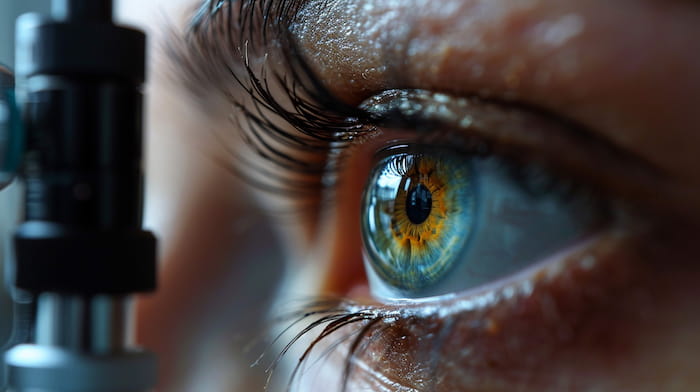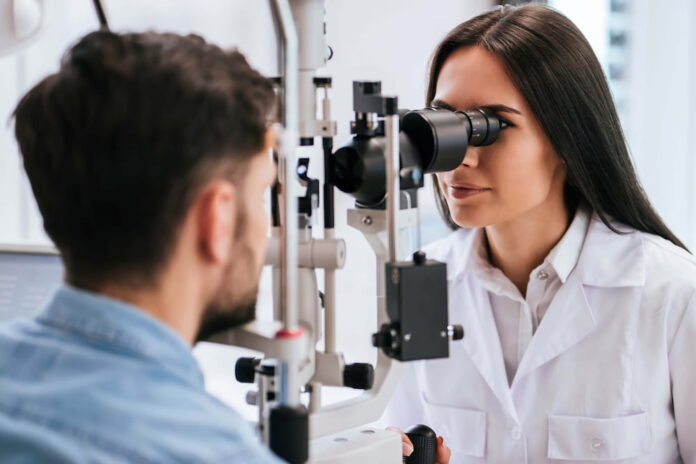Your eyes, windows to the world, are often taken for granted. Yet, when blurry vision strikes or a sudden pain shoot through your eyes, you realize just how precious clear sight is. While regular checkups are important, certain signs warrant an immediate visit to the eye doctor. Experiencing changes in vision, persistent discomfort, or having a family history of eye conditions are just a few red flags.
This article will explore five key instances that signal the need for an eye exam, sooner rather than later. By understanding these signs, you’ll be empowered to take charge of your eye health and address any potential problems before they escalate. Dive in and discover when it’s time to schedule that all-important appointment.
Experiencing Vision Changes
If you’ve noticed any shifts in your vision, don’t brush them off as “just getting older” or chalk it up to stress. These changes could be your eyes’ way of signaling an underlying issue that needs attention. Here are some of the things to watch out for:
Blurry or distorted vision
Have you been squinting more than usual at the computer screen or struggling to read street signs while driving?
Double vision
If you’re seeing two images of a single object, it could signal a problem with your eye muscles or nerves.
Halos or glares around lights
Rainbow-like halo around headlights at night could be a sign of cataracts, a common age-related condition where the lens of your eye becomes cloudy.
Floaters or flashes of light
Those tiny specks or flashes you sometimes see in your field of vision might seem harmless, but they can also be a sign of a more serious issue like a retinal tear or detachment.
Struggling to see when the sun goes down?
If you find yourself squinting or straining your eyes in the evening or at night, it could be more than just a minor inconvenience. Nighttime vision difficulties can be a sign of an underlying eye condition like cataracts, or even a nutritional deficiency like a lack of vitamin A.
If you’re experiencing any of these vision changes, don’t delay. Schedule an eye exam Toronto or with a specialist in your city as soon as possible. An eye care professional can assess your vision, determine the cause of the changes, and recommend appropriate treatment options.
Eye Discomfort or Pain

Your eyes, though small, are mighty complex. Any discomfort, from a mild itch to a sharp pain, is their way of signaling that something might be off. Don’t brush it aside as “just tired eyes.” Those seemingly minor annoyances could be a sign of something more serious brewing beneath the surface.
Here are some of the things to be wary of:
Persistent eye pain
Eye pain can be a sign of infection, inflammation, or even injury.
Dry, itchy, or burning eyes
Dry, itchy, or burning sensations can be caused by allergies, dry eye syndrome, or even prolonged screen time.
Redness or swelling
If your eyes look red or puffy, it could be a sign of irritation, infection, or inflammation.
Sensitivity to light
Do you find yourself squinting or shielding your eyes from bright lights?
.
Feeling of something being in the eye
That gritty feeling like something’s stuck in your eye can be incredibly uncomfortable. It could be a foreign object, an eyelash, or even a scratch on the cornea.
Ignoring eye discomfort can sometimes lead to more serious issues. Be proactive and prioritize your eye health. After all, your eyes deserve the best care possible!
Family History of Eye Conditions
Genes play a significant role in your eye health. If your family tree has branches laden with eye conditions, it’s wise to be extra vigilant about your own vision. Knowing your family’s eye health history is like having a crystal ball that can help predict potential risks and take preventive measures. Here are some of the conditions to look out for:
Glaucoma
This sneaky thief of sight often develops gradually, damaging the optic nerve due to increased pressure inside the eye. If your parents or siblings have glaucoma, your risk is significantly higher.
Macular degeneration
Macular degeneration affects the central part of the retina responsible for sharp, detailed vision. It tends to run in families, so be mindful of your relatives’ experiences.
Cataracts
While cataracts are a natural part of aging for many, a family history can increase your chances of developing them earlier or experiencing more severe symptoms.
Diabetic retinopathy
Diabetic retinopathy can damage blood vessels in the retina, leading to vision loss if left untreated.
Other hereditary eye diseases
Some lesser-known conditions like retinitis pigmentosa (a group of rare eye diseases that affect the retina) and Stargardt disease (an inherited form of macular degeneration) can also be passed down through generations.
Talk to your family members and gather information about their eye health history. This includes any diagnoses they’ve received, treatments they’ve undergone, and any vision changes they’ve experienced. Share this information with your eye doctor during your next check-up.
Changes in Health Conditions
If you’ve been diagnosed with a new condition or noticed shifts in existing health issues, it’s wise to schedule an eye exam to monitor any potential impact on your sight. Here are some of the conditions that can affect your eyes:
Diabetes
High blood sugar can damage the tiny blood vessels in your retina, the light-sensitive tissue at the back of your eye. This can lead to a condition called diabetic retinopathy, which can cause blurred vision, floaters, and even blindness if left untreated.
Autoimmune diseases
Certain autoimmune conditions like lupus or rheumatoid arthritis can cause inflammation in different parts of the eye, resulting in pain, redness, and vision changes.
Thyroid problems
Both hyperthyroidism (overactive thyroid) and hypothyroidism (underactive thyroid) can affect your eyes. Hyperthyroidism can cause bulging eyes (Graves’ disease), while hypothyroidism can lead to dry eyes, blurry vision, or swelling around the eyes.
Medications with potential eye side effects
Some medications, such as steroids, antihistamines, or certain antidepressants, can have side effects that affect your vision.
If you’ve been diagnosed with any of these conditions or are experiencing new or worsening symptoms, schedule an eye exam promptly.
Final Thoughts
Your eyes deserve your attention. Don’t wait for a major problem to arise before seeking professional help. Prioritize your eye health today and schedule an exam. A few simple tests could be the key to preserving your vision for years to come.
Did you find this helpful? Check out our other helpful articles on our website.
Read Also
- The Role of Ingredients in Your Skincare: What to Look ForSkincare works best when you understand what goes into the products you use daily. Ingredients form the foundation of every formula and determine how the skin reacts over time. Each cream, cleanser, or serum has its own role, determined by its ingredients. Learning what to look for helps you pick products that help skin and… Read more: The Role of Ingredients in Your Skincare: What to Look For
- Your Guide to Finding a Trusted DentistChoosing the right dentist in Sandgate or your area is crucial for maintaining good oral health and achieving a confident smile. With countless dental practices to choose from, patients may find the task daunting. Data from the American Dental Association indicates that there are over 200,000 practicing dentists in the United States, highlighting the importance… Read more: Your Guide to Finding a Trusted Dentist
- Achieving a Defined, Balanced Facial Contour in SingaporeA well-defined jawline and a gently tapered lower face — commonly referred to as a V-shaped face — is a look many people aspire to. In Singapore’s beauty and aesthetic scene, treatments that help refine facial contours have grown in popularity as more individuals seek subtle, natural enhancements that boost confidence and balance facial features.… Read more: Achieving a Defined, Balanced Facial Contour in Singapore
- The Wellness Blueprint: How Your DNA Holds the AnswerGenetic testing is revolutionizing preventive healthcare by offering insights into individual health risks. By analyzing DNA, these tests provide a personalized health blueprint that can guide lifestyle and medical decisions. This approach, often referred to as DNA wellness testing, helps to optimize health naturally and prevent potential diseases. In recent years, genetic testing has become… Read more: The Wellness Blueprint: How Your DNA Holds the Answer
- Exploring the Benefits of Infusion Therapy in OKC: The Ultimate GuideUnderstanding Infusion Therapy: A Deep Dive into Its Purpose and Process What exactly is Infusion Therapy? Infusion therapy is an advanced medical treatment that delivers medication and nutrients directly into the bloodstream through a vein, typically via an IV (intravenous) line. This method is particularly beneficial for patients who require a concentrated dose of medication,… Read more: Exploring the Benefits of Infusion Therapy in OKC: The Ultimate Guide
- Ketamine-Assisted Therapies: Impacts on Employee WellbeingWorkplace stress is common today. Many employees feel tired, anxious, or burned out. Regular therapy can help, but some people need more support. Ketamine-assisted therapy is showing good results for mental health. A ketamine-assisted therapist guides each session safely. This therapy can improve mood, focus, and energy. Learning more about it can help teams stay… Read more: Ketamine-Assisted Therapies: Impacts on Employee Wellbeing
- The Future of Men’s Health: Why Telehealth Is Here to StayTelehealth isn’t just a pandemic trend that faded into the background. For Australian men, it has become one of the most practical, time-saving, and stress-free ways to manage everyday health — and it’s shaping the future of how we access care. Platforms like DOCTO, an Australian online doctor and specialist telehealth service, are leading the… Read more: The Future of Men’s Health: Why Telehealth Is Here to Stay
- How to Build a Simple, Clean Skincare Routine ?You don’t need a complicated skincare routine. It doesn’t have to be something that requires twenty different products and confusing steps. Your routine works well with just a few high-quality clean ingredients. The beauty industry keeps pushing more products, but your skin actually needs less. You only need a simple approach to get better results… Read more: How to Build a Simple, Clean Skincare Routine ?









